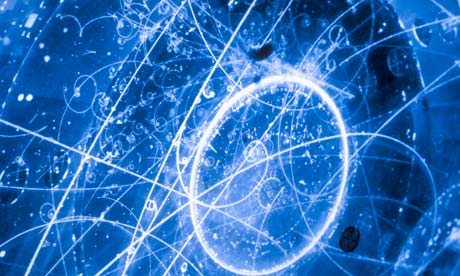
Neutrinos travelling faster than light have been found, say particle physicists in Italy. Photograph: Dan Mccoy /Corbis
– Speed of light discovery: would you go back in time? (Guardian, Sep. 23, 2011):
Physicists’ discovery of neutrinos that may travel faster than the speed of light raises the prospect of time-travelling particles. You’re not a tachyon, granted. But if you had the opportunity, would you go back in time?
– Speed of light broken – an expert’s view (Telegraph, Sep. 23, 2011):
If CERN scientists are correct in claiming they have observed particles travelling faster than the speed of light it would fundamentally change our understanding of the laws of physics, experts say.
Prof Jenny Thomas, of University College London, says the claims, if proven true, would call into question our very understanding of physics and the universe.
She said: “It would turn everything on its head. It is too awful to think about.
“The basic thing it that would be questioned is that there is an absolute speed limit which is the basis of special relativity and that is a huge building block of modern physics.
“It permeates everything to do with how we have modelled the universe and everything. It would be very hard to predict what the effects would be.”
Special relativity is integral to the understanding of particle accelerators and the creation of particle beams, which are of crucial importance in fields like medicine and engineering, she said.
It could even be that the most famous equation of all time, E=mc2, turns out to be incorrect because it is based on the law of special relativity, Prof Thomas said.
– Faster Than The Speed Of Light… OPERA Update (Universe Today, Sep. 24, 2011):
A few days ago, the physics world was turned upside down at the announcement of “faster than the speed of light”. The mighty neutrino has struck again by breaking the cosmic speed limit and traveling at a velocity 20 parts per million above light speed. To absolutely verify this occurrence, collaboration is needed from different sources and we’re here to give you the latest update.
“This result comes as a complete surprise,” said OPERA spokesperson, Antonio Ereditato of the University of Bern. “After many months of studies and cross checks we have not found any instrumental effect that could explain the result of the measurement. While OPERA researchers will continue their studies, we are also looking forward to independent measurements to fully assess the nature of this observation.”
Since the OPERA measurements go against everything we think we know, it’s more important than ever to verify its findings through independent research.
“When an experiment finds an apparently unbelievable result and can find no artifact of the measurement to account for it, it’s normal procedure to invite broader scrutiny, and this is exactly what the OPERA collaboration is doing, it’s good scientific practice,” said CERN Research Director Sergio Bertolucci. “If this measurement is confirmed, it might change our view of physics, but we need to be sure that there are no other, more mundane, explanations. That will require independent measurements.”
To get the job done, the OPERA Collaboration joined forces with CERN metrology experts and other facilities to establish absolute calibrations. There cannot be any error margin in parameters between the source and detector distances – and the neutrino’s flight time. In this circumstance, the measurements of the initial source of the neutrino beam and OPERA has an uncertainty value of 20 cm over the 730 km. The neutrino flight time has an accuracy of less than 10 nanoseconds, and was confirmed through the use of highly regarded GPS equipment and an atomic clock. Every care was given to ensure precision.
“We have established synchronization between CERN and Gran Sasso that gives us nanosecond accuracy, and we’ve measured the distance between the two sites to 20 centimetres,” said Dario Autiero, the CNRS researcher who will give this afternoon’s seminar. “Although our measurements have low systematic uncertainty and high statistical accuracy, and we place great confidence in our results, we’re looking forward to comparing them with those from other experiments.”
“The potential impact on science is too large to draw immediate conclusions or attempt physics interpretations. My first reaction is that the neutrino is still surprising us with its mysteries.” said Ereditato. “Today’s seminar is intended to invite scrutiny from the broader particle physics community.”
Original Story Source: CERN Press Release. For Further Reading: Measurement of the neutrino velocity with the OPERA detector in the CNGS beam.